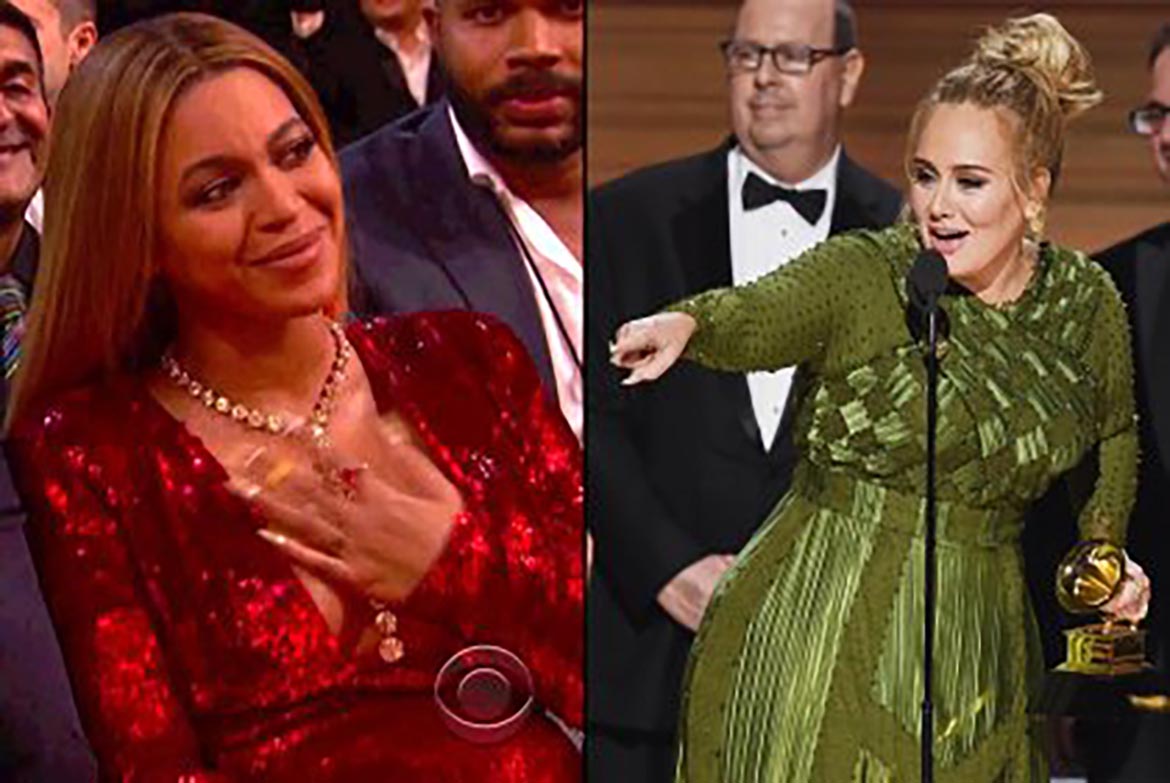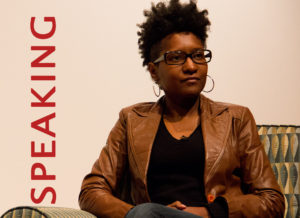I’m a big Adele fan. I have been for years. I own all of Adele’s albums and I know the words to all of her songs. If you see me walking with earbuds in, there’s a pretty good chance I’m listening to Adele. Her music has felt, for me, in times of heartbreak, especially, real and raw and connected. It’s helped get me through some stuff. I love Adele.
I became a Beyoncé fan more recently. Over the last year or so, Bey’s music and imagery have taken me from “I don’t really have an opinion on her,” to “HOLY SHIT BEYONCE IS EVERYTHING OH MY GAAAAAAAWD!!!!!!” Formation tipped the scale. The release of the Lemonade visual album, and her words in support of Black resistance, made me a solid believer. I really like Beyoncé a lot.
My affection for both Beyoncé and Adele might have you thinking that last night’s Grammy showdown had me on edge. It didn’t, though. I never even watch awards shows and my attempt to watch last night was thwarted by CBS’ janky-ass live stream. I turned it off at like 9:15, expecting Beyoncé to win Album of the Year. I expected that because I believe she deserved to win and that there could be no legitimate argument otherwise. When I woke up this morning and found out she didn’t win, I was…perturbed.
Lemonade is a better album than 25. It just is.
But that’s not what this piece is about.
What this piece is about is what happened after Adele won. It’s about Adele’s speech saying it should have been Beyoncé and what her saying that means. And does not mean.
Firstly, I see Adele’s praise of Beyoncé last night as a sincere gesture. I think she meant every word of it, including that she voted for Lemonade. I see her words as: a white woman understanding that a Black woman was slighted and maybe even that her race and gender have something to do with it. After all, only three Black women have ever won the Grammy for Album of the Year and the last was Lauryn Hill in 1999. I’ve never been a baker of “ally” cookies and I’m damn sure not going to start now, but I think Adele’s words about Beyoncé were nice, important ones and I’m glad she said them.
What Adele’s words weren’t: actions.
Adele started by saying, “Thank you, but I can’t possibly accept…” In that moment, I thought, maybe most people thought, she was going to decline the award. But she didn’t. She went on to say how great Beyoncé is, how great Lemonade is, and then she went on ahead and accepted the award anyway.
Now, I’m not saying she shouldn’t have accepted the Grammy in question. She won it. It’s hers. She has every right to accept it. What I’m pointing out is the difference between nice words and actions.
Many, many people perform nice words about privilege (and oppression). Log on to Twitter and you’ll find them quickly—white people performing nice words about anti-racism; cisgender people performing nice words about transphobia; men performing nice words about feminism. It’s all the rage. What you won’t find much of is people with privilege actually giving up things.
Maybe a year ago, a cis white man writer I used to follow—one who presented himself as an “ally”—wrote a Twitter thread about how it bummed him out that sometimes he didn’t get chosen to write pieces about things that had nothing to do with his identities, that sometimes those pieces were given to people whose identities were actually in line with the subject matter. He wrote that he understood why but, like, being rejected for a piece about Black struggle or trans struggle, etc., was still super sad for his cis white ass or whatever. Pretty quickly, smart folks showed up to let him know he was a shitshow and that not only should he not be complaining about sometimes not getting those assignments, but that he should be refusing them when they were offered and suggesting they go to actual Black, trans, etc. writers instead. This was a guy who, in my experience, knew the importance of using his privilege to help marginalized writers get freelance work. But at the exact point at which it meant NOT getting that work for himself, his understanding fell apart.
I was reminded of him, and so many other people, when I heard Adele’s speech.
Listen: I’ve never won anything as prestigious as a Grammy. I have no idea what all goes through a person’s mind when they get up on that stage. I saw a thread on Twitter this morning by a fella by the name of David Dennis, Jr. that I think does a great job of describing some of what Adele was probably experiencing in that moment regarding her white privilege and the white supremacy inherent in awards like the Grammys. My critique isn’t one of Adele so much as it is of so-called “allyship” as a whole.
I’ve written before about what it means to push back against your privilege and about the difference between real solidarity and “ally theater”. While I don’t think Adele was doing ally theater, because I do believe that her aim was to uplift Beyoncé and not herself (that’s just my take, some may disagree), I don’t believe she was doing solidarity, either. Because solidarity requires action. If Adele understands that Black women don’t get the credit they deserve, and if she wants to be part of pushing back against that, her actions have to support her nice words.
Saying nice, important things isn’t action. Breaking the Grammy in half to “share” it isn’t action (it’s still very much Adele’s Grammy).
Action last night could have looked like declining the award. As hard as that would have been. Having arguably the biggest star in popular music refuse the Grammy for Album of the Year because a Black woman artist deserved it more would have been pretty huge. It would have been the difference between nice words and a refusal to participate in such blatant marginalization of a Black woman artist. But that’s not what Adele did.
Like cis white writer guy, her understanding—her “allyship”—stopped short of giving up something she really wanted.
Real solidarity requires sacrifice. There is no way to balance out a historically unbalanced system of reward (if that is an ideal you value) without those who always get more either deciding to, or being forced to, give up some of it.
Refusing the award would have meant not having another Grammy on her shelf, but that’s not all it would have meant. It may very well have caused friction between Adele and Grammy bigwigs. It may have caused tension among her own team of people, who all contributed to the album. It may have caused her any number of difficulties. That’s what a sacrifice is.
I’m not naïve. I don’t expect people to make those kinds of sacrifices. Few people do. I didn’t expect Adele to and I’m certainly not surprised that she didn’t. What I’m saying is that…well…she didn’t. And we shouldn’t pretend that she did.
Do I hope that in the future Adele takes action in line with her words? That her understanding of her privilege leads her to not just talk about it, but be about it? Do I hope she takes action to fight marginalization of Black women artists—who, from Etta James and Ella Fitzgerald to Lauryn Hill and Mary J. Blige, she credits as having influenced her work—in all the ways she could with a platform the size of her platform? I’m not an optimist, especially where white women are involved, but…sure. That’d be really great.
Meantime, I’m still an Adele fan. I’m still a Beyoncé fan. I still really like 25. And I still think Lemonade is the better album by far. It is an epic effort, a veritable masterpiece by a great artist who, still, does not get the credit she deserves. If Adele truly understands this, if she really believes in the work that Black women artists have done, not just as inspiration for herself but as work that deserves recognition in its own right, maybe next time she’ll back up her nice words with action.

 Want to bring Mia to talk race, queerness and feminism at your school or community event? She’s now booking for Fall 2017!
Want to bring Mia to talk race, queerness and feminism at your school or community event? She’s now booking for Fall 2017!